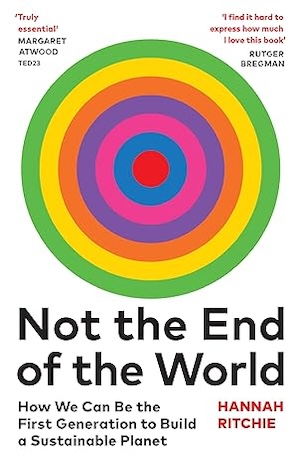 How do you alert people to the seriousness of the environmental challenges we face, while not making them feel despairing or helpless? When you want people to take action, is it better to inspire them or scare them?
How do you alert people to the seriousness of the environmental challenges we face, while not making them feel despairing or helpless? When you want people to take action, is it better to inspire them or scare them?
This is the dilemma that Not the End of the World addresses. It does not shy away from the problems but shows the progress we have already made and highlights where we can go next. Quoting Max Roser, Ritchie points out that it can be simultaneously true that “The world is much better; the world is still awful; the world can do much better”.
She motivates the reader by highlighting that we can be the first generation in history to create a sustainable world. She is using sustainable not in the sense of corporate greenwashers, but in the sense used by the UN: “meeting the needs of the present without compromising the ability of future generations to meet their own needs”.
Each chapter takes on a topic – including climate change, deforestation and food – and gives a comprehensive account of where we are and where we should be going, fully backed up with data. This could have made it a chore to read, but I was completely swept along. This is partly Ritchie’s breezy, engaging voice but also because she frames her case around popular arguments and misconceptions, along with graphs that even I can follow.
At the end of each chapter is a useful list of the best things we can do as individuals to make a difference (drive less), and a few things that either make no difference (banning plastic straws) or are even actively harmful (pasture-fed “local” beef, anyone?).
This is great, as far as it goes. I’m something of a miserabilist and anyone who closely follows green/left politics, as I do, cannot help being steeped in pessimism about the state of the world. It’s good to know that positive things are happening and that we have the answers to many of the problems we face.
But the thing is, we know that. We know that the answers are there, what is lacking is the will to implement them. And this is where the book falls down for me. While Ritchie does distinguish between rich and poor countries, she has no analysis of where wealth and power lies within and across nations. There is very little mention of the actions of governments or corporations.
She seems to envisage a world made up solely of well-meaning citizens who, if they only knew the right thing to do, would all pull together and do it. There is, in the conclusion, a call to engage with politicians or activist groups in order to let the powerful know that we care about these issues, as if that will be sufficient to make them change tack.
If there’s one thing we’ve learnt since 2016, it’s that well-meaning, articulate people armed with facts do not by themselves win arguments. We need to confront who has economic and political power and whose interests are being served.
I was also unsure about some of the specific arguments Ritchie presents (without having her expertise, clearly she could wipe the floor with me in a fact-fight). For example, her arguments about food production advocate for more high-yielding crops and artificial fertiliser (citing the Green Revolution). She points out that we already have more than enough food to feed the world, but then says we need high-tech solutions to produce even more, rather than considering issues like land ownership and control of distribution and inputs.
Ritchie suggests that as countries get richer, they naturally move to address issues like hunger and pollution because they now have the resources, which ignores the fact that both are increasing in the UK, that the government of today is blithely indifferent, and that in countries across the world extreme wealth and squalor exist side by side. (The politics of food production and climate change are brilliantly dissected by George Monbiot in Regenesis, who also backs up his statements with robust data.)
However, I do appreciate that it is useful to be able to take the most meaningful action as an individual. Individual actions add up, and they inspire and motivate people to act collectively, putting pressure on politicians and corporations.
One area in the book which gave me pause for thought is Ritchie’s arguments about nuclear power. My feeling has always been that, while accidents are rare, when they happen they are so disastrous that it’s too big a risk to take. But she argues that, even when you take account of disasters like Chernobyl and Fukushima, deaths from pollution from fossil fuels are much higher. They’re just less visible because they are taking place every day, dispersed among the population.
Not the End of the World is an upbeat, accessible and thought-provoking read, which will challenge and surprise you in some of its conclusions.
I received a copy of Not the End of the World from the publisher via NetGalley.
View Not the End of the World on Goodreads